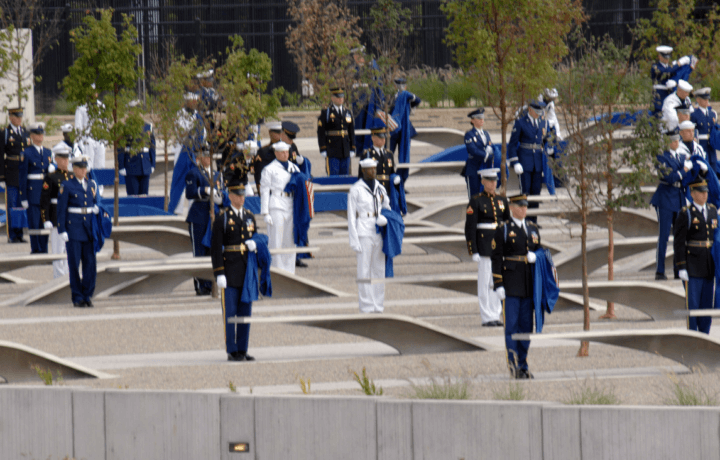September 11, 2001 was a sunny day in State College, PA, and I happened to be between classes at Penn State when the first plane struck the World Trade Center. The day passed by like a weird blur, in play-by-play moments of watching national news coverage. There were no Twitter feed to keep me posted on a minute-by-minute basis. My Nokia phone could barely send text messages. I had to wait until l logged onto a computer at the library or found a TV later in the day for any updates. But it felt like the ground underneath me had moved. Just a few hours away from New York City, safety wasn’t taken for granted the rest of the day and the 9/11 date would forever mark our country.
Not Just a Drill on 9/11
Over the last 19 years, that day comes to mind at different moments. Years ago, I worked for a small defense contractor in Arlington, VA, and we happened to have a fire drill one day. I was pregnant, and I remember the slow descent down the stairs. I knew it was a drill, but I started to feel panicky at the blaring alarm while movement remained at a complete standstill. My head knew it was a drill, but I still felt trapped. I couldn’t help but think of those who died on 9/11 trying to get to safety. That day was not a drill for them. It was a real nightmare.
Memories of 9/11 Mark today’s national security workers
Everyone has their memories about what life felt like when we were under attack. Some may have even been at the Pentagon when the third plane hit. Working in the defense industry, the memory may fade, but the wounds that it inflicted are still felt. The plane that struck the Pentagon killed 59 on the flight and 125 military and civilian personnel. As we head toward nearly 20 years post-9/11, it’s growing increasingly easy to forget what life was like before, or to remember how and why our world changed. But it’s important that we never forget. If we forget our history, we run the risk of repeating it. And if we don’t take the time to understand why many have committed their lives to preserve and protect our freedom, we run the risk of ultimately losing that freedom.
4 things we shouldn’t forget as we reflect on 9/11
I’m confident that there is more to reflect on today, but to help get you started, here are four things that we should not forget.
- Don’t forget where you were that day. If you were too young to remember, that’s important. Interview those who remember that day. Get a sense for the state of the country. How did people respond? How did communities gather together? What did people feel when they heard the news, and how did they receive it?
- Don’t forget the response. First responders rushed to the scene. Our military was ready to mobilize and protect. While the event exposed some interoperability issues that needed to be navigated, the heart behind the response was clear – one country coming together to help victims and fight against a common enemy.
- Don’t forget the narrative. Twitter wasn’t even born yet. News was mostly in print or on TV, and conversations about the event happened mostly in person. If a conversation was online, it was via email or a chat. The random narratives from people didn’t flood the system. A lot can be gained from taking our narratives about events off the grid and back to a smaller setting. Read the timeline of events. See how the world responded.
- Don’t forget the victims and their families. In today’s Twitter world, we often move on quickly to the next shiny object or issue that strikes our outrage or focus. But real people were hurt that day. Lives were altered on 9/11, and they will never feel the same again. Don’t forget the price tag that came when terrorists chose to come and attack Americans on our soil. And be thankful that while the world has changed, we don’t live in daily fear of terrorist threats today.
Remembering History is Part of National Security
Part of forging the path ahead is remember the journey already traveled. With national security at the forefront of our work, it’s important to remember that in just one day, over three thousand lives were lost. In about 12 hours, we were sorting through rubble and reeling from the evil. Countries came together to fight back against terrorists. 9/11 is a day to remember what was lost and what was learned. Whether your cleared work is actively fighting terrorists or it is keeping networks secure, it’s still vital in keeping the U.S. watchful, ready, and secure. Never forget that.




